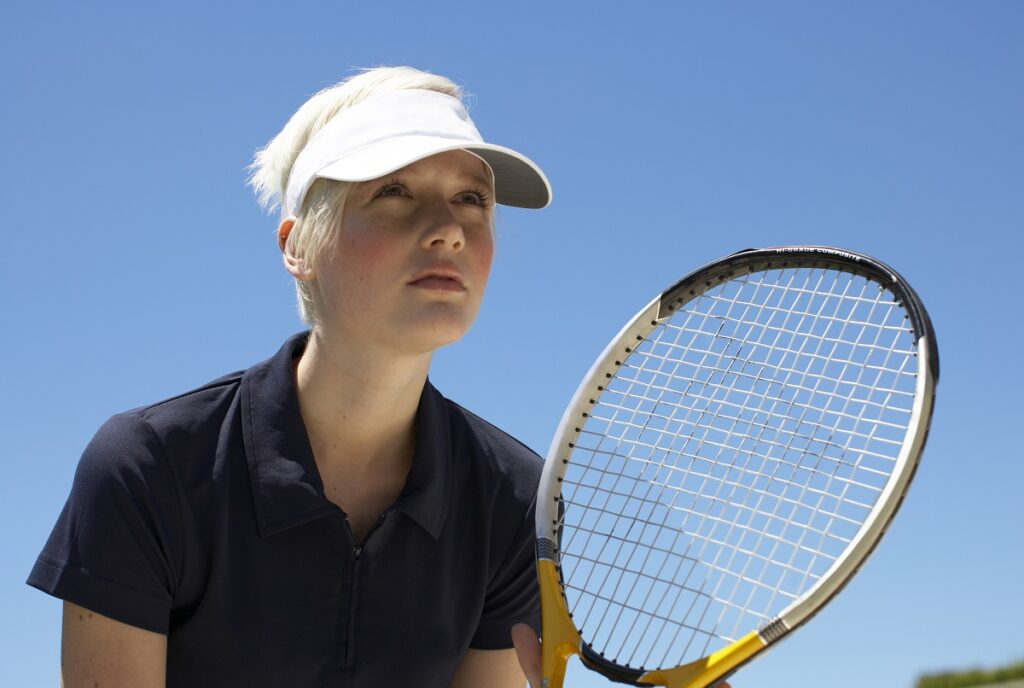A Look at the Mental Side of Tennis

Sometimes, as a tennis player, you exist on an island. Alone, solo, under the lights of your local club or drenched in the sun, there you are … between the lines, either gaining the accolades of glory hitting the winning shot or facing the weight of defeat. There are no teammates to pass to; no backup in case you throw a bad pitch or have a bad shift; no defense to pick you up after the offense turned the ball over…it’s just you who must deal with the adversity of this individual sport.
Mental toughness is what gives top players a competitive leg up over the opposition. Training one’s mind to deal with nerves, anxiety and quickly move onward past mistakes can be the difference between being crowned “champion” and “finalist.” These individuals help players focus, find their groove and enter the zone to success. It’s the ability of the player to quickly get back on track once rattled that can make the difference between bowing out in the first round of a tournament or hoisting the trophy at the end of the day.
Long Island Tennis Magazine was fortunate enough to sit down and chat with multiple experts in the field of sports psychology to pick their brains and gain insight into their role as one of the most vital members of a tennis player’s support staff.
Dr. Tom Ferraro is a sport psychologist with a Ph.D. from SUNY Stony Brook, with more than 25 years of experience working with professional teams, coaches and Olympic athletes across a broad range of sports. Dr. Ferraro is a board-certified psychoanalyst, which allows him to properly diagnose and treat the symptoms an athlete may bring to his him and help them understand any underlying reasons for self-defeat. He has been published internationally and has been featured in the New York Times, The Wall Street Journal, The London Times, and is a regular contributor to this publication.
As a mental training coach, Rob Polishook works with athletes and teams in all sports and at all levels, from middle school to professional athletes, teaching cutting-edge mental training skills and techniques, and providing the tools necessary for athletes to compete in high level pressure situations. Polishook has earned a Master’s Degree in Psychological Studies with a concentration in Sport & Exercise Psychology at Seton Hall University, and has completed his Certification in Sport Psychology from Seton Hall. Polishook is a Certified Professional Coach from IPEC, an International Federation Coaching Affiliate.
Chris Nieves, MS, is the founder and director of Empower Mental Training, which provides mental skills and sport psychology training for athletes. As a former Division I athlete, Nieves learned the importance of mastering the mental side of sports. From this experience, he decided to pursue a career in helping athletes learn how to develop a winning mindset.
The COVID-19 pandemic has brought us into unprecedented times, with isolation and social distancing keeping us physically apart. What are some of the mental challenges/obstacles this situation can cause, especially with younger tennis players?
Ferraro: There is considerable and widespread panic about COVID-19. Yet even if the fatality rate reaches 200,000 in America, the chances that any single person will die from this in a nation of 327,000,000 is much less than one percent. My recommendation is to sleep well, eat well, exercise and let go of past anger. These four factors have been proven to boost your immune system. Athletes already have strong immune systems so if you uphold the recommendations about social distancing and hand washing, and follow the suggestions I gave, you’ll be fine. A little reassurance and practical guidelines go a long way to instilling peace of mind and good health.
Nieves: One mental challenge that this situation can cause is lack of motivation. From being at home, it can be very easy to become complacent and even forget about the upcoming season. Another mental challenge is depression. For many athletes, playing sports is their outlet to manage stress and also a source of social support. So not being able to play their sport and even be with their teammates can lead many athletes to feel depressed and isolated.
Having worked with players from multiple sports, what are some of the typical mental/psychological challenges faced by tennis players than other sports and why?
Nieves: I believe one typical challenge faced by tennis players is the lack of consistent focus and concentration. Tennis is a sport that requires a great deal of focus. Compared to other sports, there are less breaks and stoppages in play, which means that tennis players need to have the ability to shift their mindset and learn how to make adjustments in their playing style in a very short period of time.
Polishook: It’s important to understand from the onset that no matter the sport, every person is an individual. Therefore, there is no typical or one-size-fits-all approach even if two players share the same presenting problem. For example, losing one’s focus. What becomes paramount is to understand at which point do they lose their focus? One player may lose focus when they are ahead because their focus is on the outcome, another player will lose focus because they look over to their friends and focus on the expectations. Lastly, another group of players may lose their focus when they are behind and give up because they focus on the score rather than their game and their process.
Are there specific methods and/or routines that you recommend players, juniors and adults, do before a match to get themselves in the right mind state?
Polishook: Yes. To begin, it’s important to understand that what happens off the court impacts what happens on the court. The athlete is a person first, athlete second. Therefore, arriving to competition in a balanced, calm and aware state is important. The question then is how to do this? Again each individual has their own set of ideas and rituals that they prefer. I highly recommend players incorporate meditation, journaling, walking or running into their routines. Additionally, eating healthy, sleeping and hydrating are key. Lastly, the evening before, players should pack their gear including everything they need for a match.
Ferraro: I would recommend these steps: get to bed early the night before; visually rehearse your strategy before you sleep; on the way to the match, get in touch and stay in touch with your aggressive side; finally, walk onto the court with a swagger, do not smile, and say little to your opponent.
How has social media led to young players facing more mental, emotional and psychological obstacles? How do you recommend them avoiding said obstacles?
Nieves: Social media has caused athletes to be more distracted which leads to them being more stressed and less focused. I would recommend that athletes limit their social media usage, especially during their sport seasons, so they can focus on themselves and not worry about what outsiders (fans, media) are saying. This could help them avoid many of these obstacles.
Polishook: Many professionals, including Serena Williams, are said to shut down all social media during tournaments. This is because social media in excess serves as a distraction for players from a time, energy and focus perspective. All too often, the phone buzzes, vibrates and rings, this stimulates the nervous system and a syndrome called F.O.M.O, or fear of missing out. Phones and social media train us to react immediately to incoming information. This takes away from a player being able to be present, in the moment and aware. Down time and quiet time are imperative to make choices and being calm and centered are integral to play good tennis. I suggest you cut your phone and social media time in half! And keep the phone in your bag during your entire training sessions. Nothing good happens by looking at your phone during training.
When negative thoughts begin to enter a player’s mind, what are some tricks or techniques to keeping their mind positive, despite the score or the way a match may be going?
Ferraro: Mistakes are common, and the difference between a champion and the rest is that the champion ignores mistakes and stays upbeat throughout the match. Often, slumps are caused by negative thinking which in turn has been caused by a big, disappointing loss in the past. Find someone to talk to about the genesis of the slump and you will be surprised how that can turn things around. You can gain insight and then get reacquainted with your power and talent.
Nieves: One way is to use positive self- talk and control your thoughts. Saying to one’s self positive affirmations such as, “I can do this”, “I am capable”, or “I am better than this” can be powerful in helping to build confidence. Another trick is to mentally step back and simplify things by refocusing on just playing tennis one point at a time.
How would you advise a player who feels they are being cheated by the umpire or is dealing with a controversial call?
Ferraro: Murphy’s Law refers to the dictum that bad things will inevitably occur in a game, and so it is best to be ready with a strategy to cope. With regard to bad calls, you can voice a protest but after this, let the experience evaporate and get back to the business at hand.
Polishook: This is a tough situation! I suggest a player go into a match knowing they are going to disagree with some calls. This acknowledgement then shifts the focus from surprise and anger to things they can control. A player cannot control the calls of their opponent, however, they can control what they do. I suggest: first time, ask the opponent if they are sure of the call. Second time, immediately get a line judge. However, it is paramount that after a bad call the player takes a deep breath, takes a few extra seconds and begins the point calm and centered, and NOT angry and upset.
How does playing within a team environment, whether it’s college tennis, high school tennis or junior team tennis, help alleviate some of the mental challenges of tennis?
Ferraro: Tennis is an individual game with you on the court all alone. Teams can be a source of fun, joy and support, and it usually helps the player’s mood. There are times when a coach will be harsh and team members can help offer solace to each other. Sometimes team dynamics are such that a player is scapegoated. If you are on the short end of the stick, find at least one player or coach you can rely on for comfort and camaraderie, and do not personalize the scapegoating.
Nieves: Playing within a team environment can be very important as it can give players a sense of togetherness. A team environment can also foster social support and mentorship, which could be valuable especially for younger players on a team. It also provides players with a team identity that could boost confidence and morale amongst the players. Overall, a strong team environment will help create an atmosphere where athletes are supporting each other, which could alleviate some of the mental challenges of tennis.
Polishook: A team environment allows a player to shift their focus off of themselves and onto something greater, such as their teammates and the team. Individual players can focus on things such as how they can contribute to the team both on and off the court, how they can support their teammates, or how can they be their best, and worry less about being the best. When a player’s focus changes to something greater than themselves, players play free and more relaxed. This is because helping and contributing to a team can be done in many ways and it’s something a player can control, whereas winning is beyond their control. Overall, players MUST keep the focus on what they can control, and when they lose this focus, make sure to change the mindset back to what they can control.







